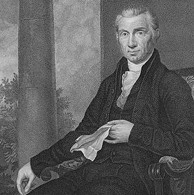
President:James Monroe
www.americancorner.org.tw | 2012-10-17 11:03

James Monroe was the fifth president of the United States (1817-1825). He is perhaps best known for establishing the foreign policy principle that came to bear his name, the Monroe Doctrine. He is also the person for whom Monrovia, the capital city of Liberia, was named. Liberia is an African country founded by freed American slaves. Monroe, a slave owner, supported their repatriation (return to their place of origin) to Africa.
Before becoming president, Monroe spent many years in public service, both domestically and overseas, and was the first president to have been a U.S. senator. Although he studied law under Thomas Jefferson, he was not as brilliant as some other leading members of the Revolutionary generation. But his contemporaries liked and admired him for his sensible judgment, his honesty, and his personal kindness. Like his fellow Founding Fathers and fellow Presidents John Adams and Thomas Jefferson, he died on July 4, the anniversary of the signing of the Declaration of Independence and the nation's official birthday.
Monroe's Popular Presidency
James Monroe easily won his party's nomination to run for president in 1816, and he just as easily won the election. His Democratic-Republican Party, which later became simply the Democratic Party, was very strong at the time. The economy was good, the rival Federalist Party was weak and unpopular, and Monroe himself was likable and popular. He was the last of the Founding Fathers to serve as president. Monroe's presidency followed some 25 years of rivalry between Democratic-Republicans and Federalists, but when he was elected with 183 electoral votes to the Federalists' 34, it signaled the end of the Federalist Party.
To celebrate his election victory, Monroe launched a 15-week tour through the New England states, the first presidential tour since George Washington's. Later tours to the South and West put him in touch with more Americans than any previous president. The Boston Columbian Centinel newspaper called his reception in Massachusetts the start of an "era of good feelings." In what speech does Monroe refer to this period of good times for the country?
In James Monroe's first inaugural speech, delivered March 4, 1817, he referred to the "present happy condition of the United States" and "the happy government under which we live." (Although elections were held in November, presidential terms originally began in March. Why? In those days it took longer to count votes because results could only be delivered by horse and messenger.)
Monroe viewed the United States as a self-sufficient, independent country when he said, "We ought not depend . . . on supplies from other countries." His 1817 inauguration was the first to be held outdoors.
What two things happened in 1819 that both tainted the "era of good feelings" but also helped Monroe maintain his popularity and win reelection?
Despite a serious recession (when the economy is weak) in 1819, Monroe won a second term as president with no serious opposition. By this time, he had become the most popular president since Washington. Many state banks had failed, however, and dragged small businesses down with them. Unemployment soared. However, at the same time, Monroe was successful in foreign policy.
For example, he sent Gen. Andrew Jackson (a future president) tothe Spanish Florida border to ward off Seminole Indians who were hostile to American settlers. This showed how weak Spain was in Florida and allowed Monroe to pressure Spain to give up the territory in 1819.
Share this page



















